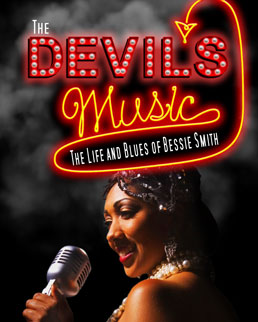
Biographical musical revues are a mainstay on the roster of the Milwaukee Repertory Theater’s Stackner Cabaret. The intimate space, dotted with tables and chairs that seat from two to eight people, is perfect for small-scale productions that feature from two to a half-dozen performers. Prior to show time, servers bustle about, delivering drink orders and desserts to the patrons. Other theatergoers spend their time chatting, scanning their theater programs or admiring the glazed brick walls, a restored remnant from the days when the space was part of Milwaukee’s old electric company. Above, large contemporary chandeliers give the place an almost homey feel. But from the first chords of The Devil’s Music: The Life and Blues of Bessie Smith, it’s clear that this space is meant to be a nightclub. Not a fancy nightclub, such as the Copacabana. No, this is a dingy, small-time nightclub in the far parts of Tennessee. It’s located not far from Chattanooga, where Bessie Smith grew up. A return to her old stomping grounds triggers Bessie’s memories of her impoverished childhood and hard-scrabble early years. That’s a far cry from the height of her career, where Bessie ruled as the “Empress of the Blues.” Prior to her 1937 death in a tragic car crash at age 43, Bessie was once the highest-paid African-American performer in America, if not the world. Her performances were legendary, and her recordings sold like hotcakes (she reminds us that not that many homes had gramophones at that time). Bessie sang with the greats of her day, such as Louis Armstrong and Benny Goodman. Her music influenced performers that followed, such as Billie Holiday, and an estimated 7,000 people attended Bessie’s funeral.
Much of this information is entertainingly interwoven into the Stackner Cabaret show. The first melody one hears is the actual voice of Bessie Smith, emanating from a radio. The radio is part of an eye-pleasing, two-tier set. One side evokes a parlor decorated in the style of the 1900s. The other tier contains an upright piano, played by DeMone as “Pickle.” Far more than an accompanist, DeMone creates the character of a beleaguered straight-man. He has to take the brunt of Bessie’s temper, her diva-like demands, and her bouts of hazy, alcohol-influenced sadness. From the moment Bessie arrives onstage, dressed in a white mink jacket and a beautifully tailored, cream-colored satin gown, Zonya Love (as Bessie) is in control. She’s a larger-than-life character who struts about the stage while delivering her songs with enough body language and facial expressions to keep the audience entranced throughout. Love is not unknown to local audiences. She played Celie in the Rep’s production of The Color Purple in 2014, as well as appearing in a previous show at the Stackner Cabaret. As Bessie, Love is by turns defiant, welcoming, bitter, hilarious, sultry and smart. In between songs, Love talks directly to the audience. She touches on Bessie’s experiences with men, booze, growing up poor, and the racial realities of her day. One infuriating incident, to which she refers several times during the show, involves a white nightclub owner. He asked her to use the back door when entering the building in which she was about to perform. As one expects from this out-sized personality, this wasn’t going to cut it. She doesn’t hold back from cursing when it suits her. Love has created an imitation that Bessie undoubtedly would approve of: a strong, powerful woman who battles the world (and the bottle) while struggling to the top. Some of the colorful, upbeat novelty tunes sent waves of laughter through the audience on opening night. When singing, “Need Some Sugar in My Bowl,” Love’s sexual gyrations leave no doubt about the lyrics’ true meaning. Other highlights include Fats Waller’s “Ain’t Nobody’s Business If I Do” and the teasing “Sho’ Nuff, Daddy.” But the heartache of the blues is never far from Bessie’s mind. Love delivers a strong rendition of “St. Louis Blues,” one of Bessie’s best-known tunes. In the same vein, she sings, “I Ain’t Got Nobody,” and “Nobody Knows You When You’re Down and Out.” In their characters as Bessie and Pickle, Love and DeMone demonstrate a nice chemistry that makes their long partnership credible. Together, they deliver a knock-out performance that will warm the heart of anyone suffering from the winter blues.
